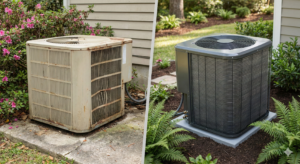If your AC kicks on and the air smells like mildew, you’re not alone. That musty scent can creep up without warning and turn a relaxing summer day in Charleston into something unpleasant. While the cool air may still be blowing, that smell is a sign something’s not quite right inside your system. The last thing you want is to spend all summer wondering if your AC is blowing mold around your home.
Charleston’s hot and sticky summers don’t help either. Moisture builds up faster, and it’s the perfect setup for mildew and mold to grow deep inside your air conditioning unit. A fresh-smelling home starts with clean air, so it’s important to figure out where that smell’s coming from before it blows across every room in your house.
Common Causes of a Mildew Smell in Your AC
Mildew smells in AC units usually mean one thing: moisture is hanging around where it shouldn’t be. This damp environment is perfect for mold and mildew to grow, and once it starts, it’s hard to ignore.
Here are some of the most common reasons your AC might smell like mildew:
1. Standing water in the drain pan – Your AC pulls moisture out of the air, and that water usually drains into a pan and out of your home. But if the pan gets clogged or overflows, water sits still and mildew can start growing fast.
2. A dirty air filter – Filters are meant to trap dust, debris, and moisture. When they get dirty and stay moist, they can become breeding grounds for mildew and end up spreading that musty smell throughout your house.
3. Clogged or moldy ducts – Ductwork can collect dust and moisture over time, especially during humid months. A small leak or crack can let in more moisture or even create a cool, dark home for mold.
4. Blocked condensate line – This pipe helps push water from the AC outside your home. Once it gets clogged either by algae, dirt, or general buildup, water backs up, leading to foul smells or even leaks.
5. Low refrigerant levels – These may not seem connected to smells at first, but if your system isn’t cooling properly, humidity may not be removed efficiently, giving mold more chances to grow.
If your AC smells off and you’ve noticed more humidity in your home or damp spots near the vents, it’s likely one of the reasons above is the cause. These issues usually get worse if left unchecked and can spread mildew smells to every room.
Health Risks Associated with Mildew in AC Units
It’s not just about a funky smell. When mildew builds up inside your air conditioning system, it can push more than cool air into your home. Mold spores and mildew particles can circulate through your ducts and end up in your lungs. That’s not something to take lightly, especially for kids, older adults, or anyone with allergies or breathing issues.
Here’s what mildew in your AC could mean for your health and comfort:
– Triggering allergy-like symptoms, such as sneezing, itchy eyes, or runny nose
– Aggravating asthma or other respiratory conditions
– Causing headaches or breathing difficulties when exposed frequently
– Making your home smell stale or damp, which can lead to stress and discomfort
Even if you’re healthy, breathing in mold spores every day isn’t good for your body. Over time, constant exposure can wear down your immune system and leave you feeling tired or congested without knowing why.
Let’s say you turn on your AC in early June, and the smell is strong and sour. You brush it off at first. A few days later, you notice your throat feels scratchy more often and your nose is running when you’re indoors. It’s easy to ignore the connection, but that mildew could be the root cause.
That’s why dealing with the smell sooner instead of later matters. If left unhandled, it affects more than just your comfort. It could impact your overall well-being over the summer months.
How to Address and Prevent Mildew Odors
Dealing with a mildew smell in your AC requires a few targeted steps. Jumping on the problem early can make all the difference in keeping your air fresh and breathable. Here’s how you can tackle mildew odors and stop them from jumping back:
– Clean the AC unit: Start by addressing the obvious spots. Clean or replace the air filter to ensure it’s not harboring any mold or mildew. Next, clear the drain pan and condensate line to prevent water buildup. If you feel handy, check the inside of your ducts and gently clean any grime that has collected.
– Schedule regular maintenance: Keeping a regular maintenance schedule for your AC is like giving your unit a check-up before things get out of hand. Professional inspections catch small problems before they snowball into bigger ones, ensuring everything runs smoothly without hidden moldy surprises.
– Maintain a dry environment around your unit: Moisture is a mildew magnet, so keep the area around your AC as dry as possible. Make sure nothing clogs the drainage paths and place the unit in a spot with good ventilation. When doing yard work, keep excess grass or leaves away to prevent them from dampening things up. Dehumidifiers can also help in particularly muggy areas of your home.
One practical example would be cleaning or replacing filters with the change of seasons. Just like swapping out your wardrobe, moving from winter to summer, or vice versa, a fresh filter can improve air quality without extra odors sneaking in.
Signs You Need Professional Help
Not every problem is a quick fix. Sometimes, the issue is more than grime or basic wear and tear. Here are signs that it’s time to call in the experts:
– Odors persist after cleaning: You’ve given the unit a good cleaning, yet that musty smell lingers. This suggests there might be a larger problem lurking deeper inside your system.
– Recurring mildew growth: If mildew keeps coming back shortly after cleanup, it’s likely that all origins of the moisture weren’t entirely dealt with, needing a professional’s eye to pinpoint trouble spots.
– Visible mold: Sometimes, mold is more conspicuous, showing on vents or around the unit. This isn’t just an AC issue. It’s also a potential health risk, requiring expert intervention to make sure all the mold is removed safely.
– Poor airflow or cooling: If the air doesn’t seem to be circulating well, or if it’s not cooling as it used to, there might be more going on than just odors, signaling that a more thorough inspection is needed.
Calling in a professional is your best bet when your AC’s behavior is cryptic or beyond DIY measures. Experts provide a detailed look and specific solutions that keep your system running healthily, especially during Charleston’s high humidity.
Keep Your AC Fresh and Efficient
A mildew-free AC means a comfortable home. Think of your AC as a core part of your home’s environment, where timely interventions keep both the air and your family healthy. Addressing the distinctive mildew smell promptly helps stop minor issues from growing into something bigger, ensuring your unit operates smoothly all summer long.
By keeping an eye on moisture levels, regularly cleaning the AC, and scheduling maintenance, you’ll head off those unwanted odors before they hit full force. Beyond just fresh air, it’s about maintaining peace indoors when temperatures soar outside. Regular attention to your AC not only keeps smells at bay but extends the life and efficiency of your system, making every Charleston summer cooler and more pleasant.
Regular upkeep of your AC can make all the difference in avoiding unexpected mildew smells. If your air conditioning unit needs some extra attention, consider scheduling AC maintenance in Charleston. Coastal Carolina Comfort is here to ensure your system operates efficiently and stays odor-free, providing you with peace of mind and a refreshing indoor atmosphere all summer long.


